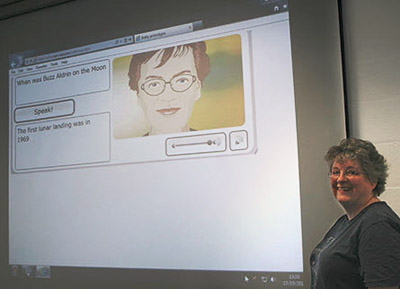Endless possibilities of Computer Science: women in software
Posted on 12 March 2014
Endless possibilities of Computer Science: women in software
 By Collette Curry, Postgraduate Computer Scientist at Manchester Metropolitan University.
By Collette Curry, Postgraduate Computer Scientist at Manchester Metropolitan University.
This article is one of the articles in our series Women in Software, in which we hear perspectives on a range of issues related to women who study and work with computers and software.
I always had a natural curiosity about computers, but never dreamed I’d be studying artificial intelligence at such a high level!
When I was younger, my brother had a Sinclair Spectrum computer, this captured my imagination as all I had seen before it were primitive games on the television played via simple games consoles. I soon managed to get my hands on a Sinclair ZX81 with a 16k expansion pack, tape player and a small Sinclair printer from a friend who didn’t want them anymore. I found myself spending hours and hours looking over code for games printed in computer magazines and learning, often through trial and error, to improve on them. I was in awe at the adventure type games that were available and decided to have a go at coding one myself. This was no mean feat as the 16k pack only had to move slightly and the program was lost and had to be reloaded. I persevered and before long had a workable game to play with. This was the beginning of my involvement with computers.
A few years later, I found myself on the Design for learning undergraduate course at Manchester School of Art. One of a year group of only nine students who undertook various modules from photography, illustration, sound recording, computer aided teaching and learning, and film recording. I of course, specialised in computing and produced a reading game for children with learning difficulties. I was for the first time, making something that others found useful. I found this to be very rewarding and decided that I liked this aspect of programming very much. I was not discouraged by some of my advisors who said that computer software was limited as an occupation and hard to get into. I decided that computing was for me, and that I’d learn everything I could and prove that I could achieve something with computers.
In my early working life I was a computer technician, which gave me lots of good experience about how to build and repair computers and I enjoyed setting up training sessions for other technicians. I was one of the few female computer technicians at the time and worked as part of a great team of people who were mostly male. After several years of this I changed careers and got a job as Education Officer at Stockport Museum Service, where for part of my work I produced programs for the Green Gallery on the theme of Earth, Air, Fire and Water. I evolved my programming skills to include web design and in my free time worked for community groups who couldn’t afford to get websites done, as well as repairing computers for friends and family.
As tools like Joomla, Drupal and Wordpress came on the scene it became obvious that web design skills were not required as much as they once were, so I looked for something else to develop, challenge and use my computing skills. It arrived in the local Evening Newspaper in the shape of an advert for an MSc Computing course at Manchester Metropolitan University. I applied and was accepted on the course part-time, so I could still do my own work at the same time. All was looking great. The course was exceptionally good and helped hone my programming skills as well as teaching me about information systems, databases and multi-media applications. The majority of students were male, but that didn’t matter or affect my enthusiasm. For my final project, I produced a chatbot that told stories about the HMS Ark Royal ships through history, for which I gained a distinction and in the end I received a merit for the MSc.
I’m now completing a PhD in artificial intelligence where I have coded a conversational agent called Betty. Betty is a reminiscing aid and helps older people improve their aging memory and also increases well-being through the conversation. I am one of a small group of students working with the Intelligent Systems Group at Manchester Metropolitan University. My supervisory team in the shape of Jim O’Shea and Keeley Crockett are excellent. The faculty research office staff is second to none in their support for the admin side of the course and have been such a great help during my studies. So many people have assisted me in my computer journey and I hope that through my work I can show them my thanks.
I took part in the recent British Computer Society Machine Intelligence competition and was a runner-up in the final. Was invited to present a workshop for the BCS Artificial Intelligence group in London on my work with conversational agents. The excitement continues, as I have been shortlisted for part two of the UK ICT pioneers competition for this year, hopefully I’ll get through to the final in London.
In fact, I’m having a tremendous time in computing. When I think back to my teenage self, I could not have imagined where I would be now. Computing is my life, it is everything that I hoped it would be and more. There are endless possibilities, so much to learn and so much knowledge to be shared with others. I am using my creativity as an artist combined with my imagination as a programmer to fulfil a dream that I once thought was not possible. I was given the impression that girls don’t code, but once I had the means to try it out myself, I discovered that not only do girls code, they code well!
